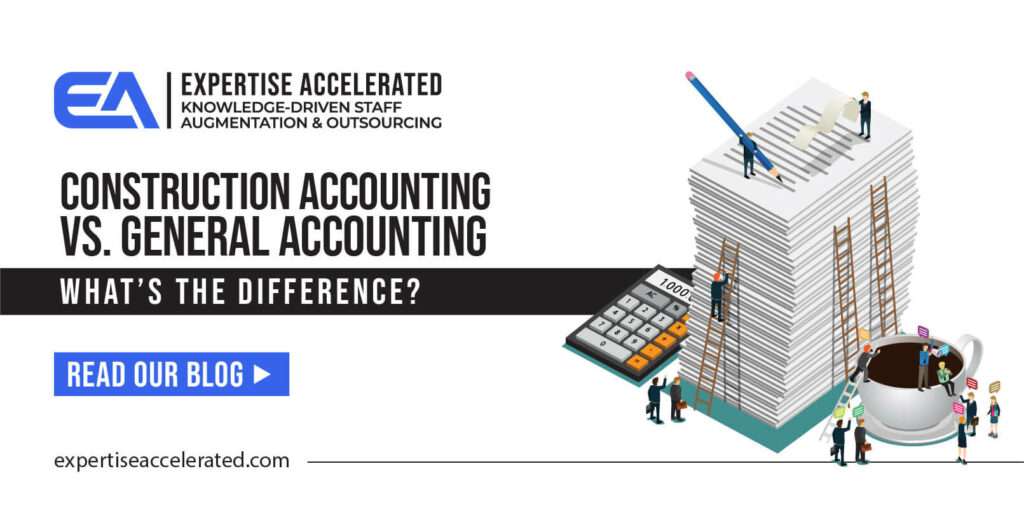Construction Accounting: How to Maintain Accurate Records and Improve Cash Flow
Construction Accounting: How to Maintain Accurate Records and Improve Cash Flow
Blog Article
Recognizing the Significance of Building And Construction Audit for Effective Project Management

Duty of Building Accountancy
Construction audit acts as the backbone of financial monitoring in the construction market, ensuring that jobs are completed within spending plan and economic purposes are fulfilled. construction accounting. This customized accountancy approach addresses the special difficulties dealt with in construction tasks, including varying project durations, fluctuating expenses, and several stakeholders
One of the primary functions of building bookkeeping is to provide precise expense estimate and monitoring throughout the job lifecycle. This promotes enlightened decision-making, allowing job supervisors to adjust resources and timelines effectively. Furthermore, building accountancy improves money flow management by keeping track of accounts payable and receivable, thus guaranteeing that funds are offered for timely payments to subcontractors and suppliers.
It gears up task managers with the needed economic information to prepare detailed monetary declarations, which are essential for audits and economic reviews. Eventually, the function of construction accountancy expands beyond mere monetary monitoring; it is essential to calculated planning and functional efficiency, driving the success of building jobs in an affordable landscape.
Key Parts of Building Audit

Budgeting develops a monetary framework that overviews job execution, permitting supervisors to assign resources efficiently and anticipate possible monetary challenges. Exact price tracking is necessary for tracking expenses in real-time, helping to identify variations in between forecasted and actual costs. This makes it possible for timely changes to keep the task on budget plan.
Moreover, monetary reporting supplies stakeholders with a clear picture of the job's financial health and wellness. Routine reports, such as revenue and loss declarations and capital analyses, assist in informed decision-making and improve openness among all celebrations entailed.
Additionally, compliance with sector regulations and accountancy criteria is vital. This ensures that monetary techniques are not only efficient yet also legal, guarding the organization against legal effects. By integrating these essential elements, construction bookkeeping cultivates an organized method to handling funds, ultimately contributing to the effective conclusion of building and construction projects.
Benefits for Job Supervisors
Leveraging reliable construction accounting practices provides project managers with a wide range of advantages that boost both functional performance and monetary oversight. One considerable advantage is improved budget monitoring. Exact monitoring of costs and incomes permits job managers to check financial efficiency in genuine time, making certain projects remain within budget plan and assisting in prompt changes when essential.
Moreover, building bookkeeping streamlines capital management, making it possible for job managers to optimize and prepare for monetary demands resource allocation. By comprehending cash inflows and discharges, they can better take care of repayments to subcontractors, suppliers, and staff members, thereby staying clear of expensive delays.
Furthermore, robust audit systems offer comprehensive reporting capacities. Job managers can produce records that offer insights right into task success, price variances, and resource use. This data-driven approach fosters notified decision-making, permitting supervisors to identify prospective concerns proactively and execute rehabilitative steps.
Finally, adherence to construction bookkeeping requirements makes certain conformity with regulative and lawful needs, decreasing the see risk of penalties or conflicts. Generally, reliable building and construction accounting gears up job managers with the tools needed to drive job success, boost stakeholder self-confidence, and advertise long-term organizational development.
Typical Obstacles in Building And Construction Accounting
Many job supervisors come across considerable difficulties in building and construction accountancy that can prevent task success. Among the main difficulties is the intricacy of tracking numerous work websites, each with unique budget plans, timelines, and resource allocations. This requires meticulous attention to information, which can be frustrating without a robust audit system in position.
In addition, rising and fall product costs and labor rates can make complex budget plan management, making accurate projecting challenging. Project supervisors often battle to resolve these prices with actual expenditures, causing prospective financial disparities.
Additionally, building accounting entails compliance with numerous policies, consisting of tax look at this website obligations and labor regulations. Navigating these rules can be daunting, especially for managers that may not have a solid bookkeeping history.
One more significant difficulty is managing money flow, which is critical in the building industry. Delays in invoicing, payments from customers, or unexpected job changes can produce capital shortages, threatening the project's development.
Lastly, efficient communication in between task managers, accountants, and field groups is important. Misconceptions can result in imprecise financial reporting, even more making complex job management efforts. Attending to these obstacles proactively is important for effective building and construction audit.

Ideal Practices for Effective Audit
While browsing the intricacies of building bookkeeping can be complicated, embracing best practices basics can significantly enhance monetary administration and job success. One basic method is preserving timely and exact documents. Carrying out durable audit software program customized to building projects can improve data entrance, invoicing, and coverage, conserving and decreasing errors time.
In addition, establishing a clear spending plan and routine monitoring against this spending plan are critical. Utilizing a system of periodic financial reviews permits project supervisors to determine variations early, helping with timely decision-making. It is additionally necessary to separate project prices into indirect and direct categories, enabling more clear understandings right into profitability.
Another finest practice includes cultivating open interaction among all stakeholders. Normal updates and collective conversations about economic condition can ensure everybody is aligned and notified. Training team in construction-specific bookkeeping concepts further boosts proficiency and precision.
Lastly, making certain compliance with appropriate bookkeeping criteria and regulations is non-negotiable. Regular audits and interior reviews add to openness and accountability, developing trust fund with clients and stakeholders. By concentrating on these best methods, building companies can maximize their audit procedures, ultimately driving job success and financial stability.
Final Thought
Finally, construction bookkeeping plays an essential function in making certain effective task management by facilitating accurate financial oversight and improving decision-making. By integrating essential elements such as expense estimate, cash money circulation monitoring, and conformity, job supervisors can navigate typical difficulties and take advantage of finest methods for efficient audit. Eventually, a durable building bookkeeping framework not only safeguards budget honesty yet additionally adds to the general financial health of construction tasks, cultivating lasting success within the industry.
By incorporating these vital parts, building bookkeeping fosters an organized technique to handling financial sources, eventually contributing to the effective completion of construction tasks.
Precise tracking of incomes and expenses permits job managers to check monetary performance in actual time, guaranteeing projects stay within budget and promoting timely adjustments when necessary.
Project supervisors can generate records that offer understandings into job success, price variations, and source usage.Several job supervisors experience substantial challenges in building and construction bookkeeping that can prevent project success. construction accounting. Inevitably, a robust building audit framework not just safeguards spending plan stability yet also contributes to the total economic wellness of building tasks, fostering sustainable success within the sector
Report this page